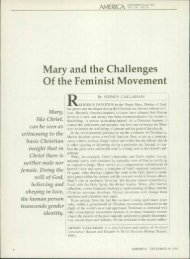Download PDF - America
Download PDF - America
Download PDF - America
Create successful ePaper yourself
Turn your PDF publications into a flip-book with our unique Google optimized e-Paper software.
The Catholic tradition walks a middle way between thereligious positivist, who says we ought to rely only on religiousauthority, and the new atheist, who claims reason tobe self-sufficient. Catholics affirm the need for communityand the value of the accumulated wisdom of the past;Catholics also hold that each person is created with a conscienceand has access to the natural law through the exerciseof his or her moral intelligence. God teaches us throughthe exercise of our reason within the church and the broadersocial world within which we act.Second, some Christians assert that belief in God suppliesa necessary motive for doing right and avoiding wrong.The so-called sanction argument holds that fear of divinewrath keeps people on the narrow path; without it people arecapable of anything. The new atheists properly target thosewho take this deeply pessimistic view of the human person,curbed from evil only by threat of eternal punishment. AsHarris puts it, our “common humanity is reason enough toprotect our fellow human beings from coming to harm.”On this point, Catholic moral anthropology is closer tothe new atheists than to Christian fear-mongers. It regardseach person’s conscience as capable of being moved by aninnate “connaturality” with the good. God does not inspirein us a servile fear, which, as David Hume noted long ago,is an essentially egocentric position. Rather, Christian lifecalls us toward authentic love of God, neighbor and self andteaches us that we ought to fear sin and love God as our saviorand redeemer.Third, the new atheists reject the claim that only beliefin God provides the basis for exceptionless moral prohibitions.Harris regards moral absolutism as proposing a “certaintywithout evidence” that “is necessarily divisive anddehumanizing.” Even Christian critics see the questionbeggingnature of an apologetic tack that takes for grantedthe legitimacy of moral absolutes. It also ignores the factthat some atheists display a very strong moral code, justifiedby reasons independent of belief in God. The new atheistsrecognize the wrongfulness of murder, rape and the like. Yetone might argue that this thin concession does not providea sufficiently detailed ethic regarding morally complex andcontentious cases, especially concerning the most vulnerableamong us. Moral absolutes against abortion, embryonicstem cell research and physician-assisted suicide can bemaintained, Christians might argue, only by reliance ondivinely mandated or church-endorsed morality.Yet the fact that Christians themselves are sharply dividedover the ethics of life indicates that belief in God does notnecessarily guarantee consensus over the content of particularmoral absolutes. The significant gap between the smallminority of Christians who accept the absolute prohibitionon artificial contraception and the vast majority who differentiatebetween its properand improper usesChristian ethics is based on the belief thatthe purpose of human existence is neitherthe ‘replication of genes’ nor the ‘survival ofthe fittest,’ but the development of ourcapacity to understand and to love.illustrates this point. TheCatholic natural law traditiondoes not teach thatwe come to know thestrictly binding characterof these norms onlythrough divine revelationor ecclesial instruction. Itaffirms that one canattain knowledge of moral norms through the use of humanmoral intelligence.Is Christian Ethics Irrational?A major issue raised by the new atheists concerns the relationbetween Christian morality and reason. The new atheistswant us to reject Christianity for the sake of moralprogress, then to draw an antinomy between two massivedomains of human agency—reason and religion—in orderto promote the dominance of the former and the destructionof the latter. At times they concede that the Christiantradition has made some important historical contributionsto human well-being (including universities and hospitals),but they argue that everything good in the Christian traditionis because of the operation of reason within it.Conversely, everything bad in the tradition is because ofreligion, not reason. This line of argumentation is arbitrary,tendentious and viciously circular. It ignores the fact thatthe global (and ill-defined) categories of “reason” and “religion”are not alternatives but rather two forms of humanactivity that can be related variously: competitively, cooperativelyor in other ways. From a Christian standpoint, thecause of evil can be attributed neither to religion nor reason,but to human sin—the willful decision to put what is essentiallygood to evil uses out of greed, pride or other twistedmotivations.There is no question that sometimes evildoing has beenpursued under the guise of religion, but the same can be saidof science. The new atheists display their innocence of thecomplexity of historical causation when they simply point to“religion” as the prime cause of the wrongdoing of24 <strong>America</strong> May 5, 2008









